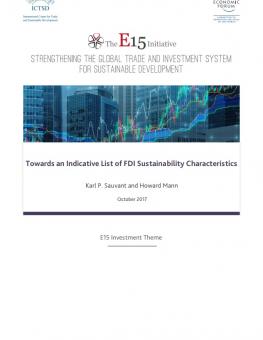
Towards an Indicative List of FDI Sustainability Characteristics
Based on a review of 150 instruments, ranging from international investment agreements to codes of multinational enterprises, this paper identifies ten core characteristics of sustainable FDI and twenty emerging sustainable FDI characteristics widely accepted across ten stakeholder groups
Based on a review of 150 instruments, ranging from international investment agreements to codes of multinational enterprises, this paper identifies ten core characteristics of sustainable FDI and twenty emerging sustainable FDI characteristics widely accepted across ten stakeholder groups.
The paper explores furthermore opportunities and mechanisms to advance the application of the sustainability characteristics. The FDI sustainability characteristics are also of immediate relevance for the discussions of investment facilitation.
Description provided by International Centre for Trade and Sustainable Development (ICTSD).
You might also be interested in
Agreement on Climate Change, Trade and Sustainability: A landmark pact for trade and sustainability
The ACCTS pact, signed by Costa Rica, Iceland, New Zealand, and Switzerland, aligns trade and environmental policies, tackling fossil fuel subsidies, eco-labels, and green trade.
Why the Energy Charter Treaty Modernization Doesn't Deliver for Climate
The Energy Charter Conference adopted the "modernized" Energy Charter Treaty (ECT) on December 3, 2024. IISD's Lukas Schaugg explains what the modernization does, when it will enter into force, its tension with EU law, and why the reformed ECT can still hinder climate policies.
Addressing Carbon Leakage: A toolkit
As countries adopt ambitious climate policies, this toolkit examines strategies to prevent carbon leakage—when production and emissions shift to nations with weaker climate policies—and explores the trade-offs of each approach.
IISD Trade and Sustainability Review, December 2024
This edition of the IISD Trade and Sustainability Review presents four expert perspectives on how agricultural support and subsidies can promote sustainability in developing and least developed countries.